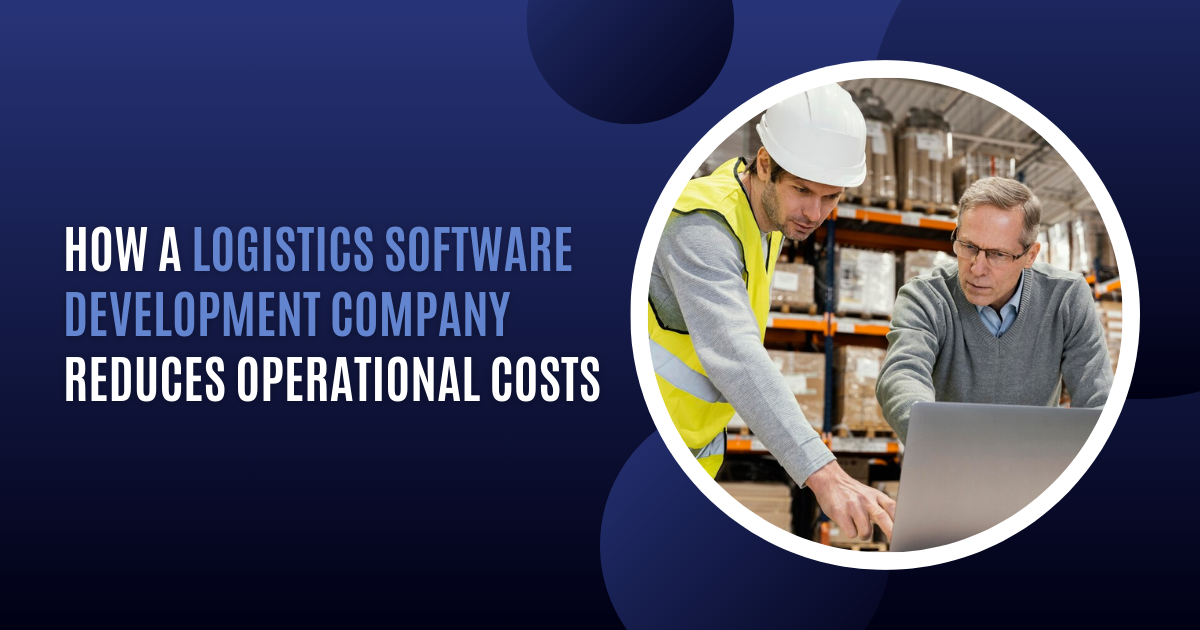How a Logistics Software Development Company Reduces Operational Costs

Strong 8k brings an ultra-HD IPTV experience to your living room and your pocket.
In the highly competitive world of logistics, businesses face constant pressure to improve efficiency and reduce operational costs. The logistics sector involves multiple moving parts, including supply chain management, transportation, inventory management, and customer service. To stay competitive, logistics companies must find innovative ways to streamline their processes while cutting costs. One such solution is leveraging logistics software.
A logistics software development company can help reduce operational costs significantly by providing tailored solutions that enhance productivity, automate processes, and optimize resource allocation. This article will explore how logistics software development reduces operational costs, focusing on the technical aspects of software, its key features, and how a logistics software development company can help.
The Growing Need for Logistics Software
The logistics industry is evolving rapidly. According to Statista, the global logistics market was valued at over $8.1 trillion in 2020, and it is expected to grow by 4.5% annually. This growth presents challenges in managing operations efficiently. Logistics companies are constantly looking for ways to handle increased demand while keeping operational costs under control.
Traditional manual processes, such as paper-based records and spreadsheets, are not enough to manage the complexities of modern logistics. Logistics software offers a solution by automating many of the processes involved, improving visibility, and enhancing decision-making. The right software can reduce manual errors, optimize routes, improve inventory management, and enhance customer service, all of which contribute to lowering operational costs.
Key Ways Logistics Software Reduces Operational Costs
1. Automation of Manual Tasks
One of the most significant advantages of logistics software is its ability to automate routine tasks. This automation reduces the need for human intervention in time-consuming activities, such as data entry, order tracking, inventory updates, and route planning. Automation not only saves time but also reduces the likelihood of errors.
For example, a logistics software development company can create a solution that automatically updates inventory levels as products are shipped or received. This eliminates the need for manual inventory checks, saving both time and labor costs. Furthermore, automated route optimization tools can calculate the most efficient routes for delivery, reducing fuel consumption and vehicle wear and tear.
2. Improved Route Optimization
Routing is a critical aspect of logistics operations, particularly in transportation. Improper routing can result in wasted fuel, excessive time spent on the road, and delayed deliveries. A logistics software development company can design software solutions that use algorithms and real-time data to optimize delivery routes.
Route optimization software takes into account various factors, such as traffic conditions, delivery deadlines, and fuel costs, to find the best route for each vehicle. For instance, companies like UPS use route optimization software, which saves millions in fuel costs annually. By using such solutions, logistics companies can reduce fuel consumption and vehicle maintenance costs, leading to significant savings.
3. Enhanced Inventory Management
Inventory management is a critical part of logistics that directly impacts operational costs. Poor inventory management leads to either overstocking or stockouts, both of which can be costly. Overstocking ties up capital and warehouse space, while stock outs result in missed sales and customer dissatisfaction.
A logistics software development company can create an advanced inventory management system that helps businesses keep track of stock levels in real-time. This system can use data from various sources, such as sales trends and supplier lead times, to predict demand more accurately. By keeping inventory at optimal levels, companies reduce storage costs and the risk of stockouts, leading to improved cost efficiency.
4. Real-Time Tracking and Visibility
Logistics software can provide real-time tracking of shipments, vehicles, and inventory. This visibility allows businesses to monitor the status of deliveries and shipments at any point in time. Real-time tracking also helps prevent theft, loss, or misplacement of goods.
For example, a logistics software solution with GPS tracking capabilities allows managers to monitor vehicles in real time, ensuring that deliveries are on schedule. In case of delays, the system can automatically notify customers and suggest alternative actions. This proactive approach not only reduces operational disruptions but also improves customer satisfaction, which can lead to repeat business.
With better visibility, logistics companies can optimize their processes, reduce delays, and ensure better service, all of which lead to cost savings.
5. Optimized Warehouse Operations
Warehousing is another area where logistics software can reduce operational costs. Efficient warehouse management is crucial for reducing labor costs, improving space utilization, and minimizing order fulfillment errors. Logistics software can integrate with automated warehouse systems, such as robotic picking or sorting systems, to improve warehouse efficiency.
For example, a logistics software solution that integrates with warehouse automation systems can track inventory, organize stock, and manage shipments more effectively. By optimizing warehouse layout and workflows, the software can reduce the time workers spend moving goods, leading to cost savings.
Moreover, efficient warehouse management ensures that stock is stored correctly, which prevents inventory damage and reduces the need for reordering. This reduces both storage costs and procurement expenses.
6. Improved Supplier and Vendor Relationships
In logistics, maintaining strong relationships with suppliers and vendors is crucial. Poor communication or inefficient processes can lead to delays, errors, and additional costs. Logistics software can help automate communication with suppliers, manage orders, and track performance, leading to more efficient operations.
A logistics software development company can build a solution that integrates supplier and vendor management into the logistics workflow. This integration ensures that inventory levels are accurately tracked, orders are placed on time, and communication is seamless. By improving supplier relationships, companies can negotiate better rates, reduce delays, and lower procurement costs.
7. Data-Driven Decision Making
Data is a powerful tool in logistics. The more data a company has about its operations, the better it can make informed decisions. Logistics software gathers vast amounts of data from various processes, including shipments, deliveries, inventory, and customer interactions.
This data can be analyzed to identify inefficiencies, predict demand, and uncover opportunities for cost savings. For instance, data analysis can help identify the most efficient routes, highlight areas where inventory is overstocked, or pinpoint suppliers that offer the best rates.
By making data-driven decisions, logistics companies can eliminate waste, reduce operational costs, and improve overall efficiency.
How a Logistics Software Development Company Can Help
To implement a logistics software solution, businesses must partner with a logistics software development company with expertise in the field. A professional logistics software development company brings a wealth of experience and technical know-how to the table, ensuring that the software is tailored to the company's unique needs.
1. Custom Solutions for Specific Needs
Every logistics business is different, and a one-size-fits-all software solution may not meet the specific needs of the company. A logistics software development company works closely with clients to understand their requirements and design custom solutions. This approach ensures that the software addresses the unique challenges of the business and delivers the most value.
For example, a company that specializes in cold chain logistics may require software with specific temperature monitoring features. A logistics software development company can build such custom features into the software to ensure proper temperature control throughout the transportation process.
2. Scalability and Flexibility
As logistics companies grow, their software needs will evolve. A reputable logistics software development company ensures that the software is scalable and can handle increasing demands. The solution should be flexible enough to accommodate future updates, expansions, and new features without requiring a complete overhaul.
Scalable software is essential for businesses that plan to expand into new regions or add new services. A development company can ensure that the software is adaptable and ready for future growth.
3. Ongoing Support and Maintenance
The logistics software needs to be maintained and updated regularly to ensure that it remains efficient, secure, and compliant with industry standards. A logistics software development company offers ongoing support and maintenance services, ensuring that any issues are addressed quickly and the software remains up to date with the latest technological advancements.
4. Integration with Existing Systems
Logistics companies often have multiple systems in place, including ERP (Enterprise Resource Planning) systems, CRM (Customer Relationship Management) software, and inventory management tools. A logistics software development company can ensure seamless integration between the new logistics software and existing systems. This integration helps maintain data consistency across different platforms, reducing the chances of errors and duplications.
Conclusion
Reducing operational costs is a top priority for logistics companies, and logistics software development plays a vital role in achieving this goal. By automating processes, optimizing routes, enhancing inventory management, and providing real-time tracking, logistics software can significantly reduce inefficiencies and lower costs.
Partnering with the right logistics software development company can help businesses create custom solutions that meet their specific needs while offering scalability and flexibility for future growth. In the competitive logistics industry, adopting the right software solution can lead to more efficient operations, improved customer satisfaction, and significant cost savings.
Note: IndiBlogHub features both user-submitted and editorial content. We do not verify third-party contributions. Read our Disclaimer and Privacy Policyfor details.







